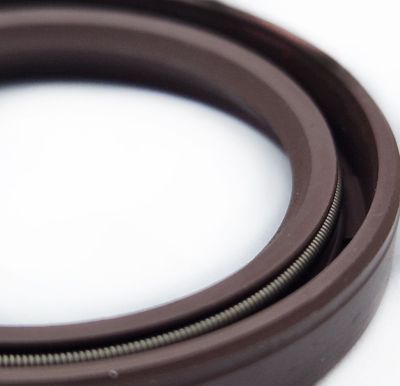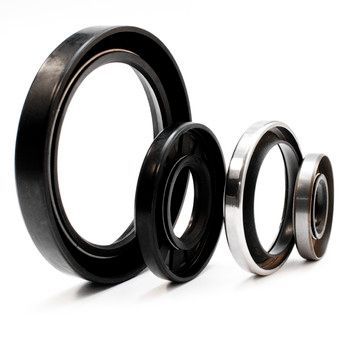Rotary shaft seals
The rotary shaft seal, also known as radial shaft seal, or oil seal, provides sealing around a rotating shaft. The primary media to be sealed are oils and lubricating greases.
Techné offers the most common profiles, standardized to DIN 3760 / ISO 6194. Different profiles and materials are chosen based on the nature of the fluid, the level of external contamination, the qualities of the shaft and housing, shaft speed, temperature, pressure, etc.
The difference between the SL and DL profiles lies in the presence of an additional dust protection lip in the DL. Upon request, the seals can also feature a helix on the lip.
Order online
Standard profiles
The standard profiles SL and DL correspond to types A and AS according to DIN 3760 / ISO 6194. The rubber covered metal case allows an easy fitting and guarantees good sealing of gas and liquids.
The oil seal types AEX SL and AEX DL, corresponding to B and BS types according to DIN 3760 / ISO 6194, have a machined outer metal case that ensures precision fitting and a good stiffness in the housing.
The oil seal types T2 SL and T2 DL, which correspond to the C and CS types according to DIN 3760 / ISO 6194, has a double outer metal case and provides a precision fitting and an excellent stiffness in the housing.
Techné also produces small quantities of machined rotary shaft seals.
Send a requestApplications
The rotary shaft seal is used in rotary applications. It is mounted in the engines and transmissions of the following sectors:
- Agricultural and construction machinery
- Machine industry
- Automotive industry: engines (crankshaft), gearboxes, manual transmissions, pumps
- Railway industry
- Food and chemical industry

Materials
Based on the operating temperatures and chemical environment, Techné offers several materials for the rotary shaft seal:
Steel (standard) or stainless steel (on request)
- Rotary shaft seal in NBR (nitrile)
- Rotary shaft seal in FKM (fluoroelastomer)
- Rotary shaft seal in silicone (VMQ)
- Rotary shaft seal in EPDM
- Rotary shaft seal in ACM/AEM (acrylic rubber)
Steel (standard) or stainless steel (on request)

Rotary shaft seal selection
The type of rotary shaft seal to be used depends on the operating conditions and is primarily defined by three elements:
The type of reinforcement is chosen based on the housing, mounting methods, and forces applied to the ring.
The sealing medium, the level of external contamination, and the application specifics define the type of lips.
The level of radial force on the lip is chosen based on the nature of the fluid to be sealed, the operating speed, and the shaft mounting tolerances.
When the sealing ring is applied near a bearing or gear, the lip heats up quickly and can eventually deteriorate or damage the shaft. To address this issue, Techné offers to groove the lip in the direction of shaft rotation:
- Left helix
- Right helix
- Bi-directional helix
High pressure seals
The standard seals are designed for rotation without pressure. Occasional over pressures may be tolerated depending on the shaft rotation speed (maximum) 0.5 bar.
Special seals guarantee sealing performance under high pressure:
- An additional 'L' support ring, in addition to the rotary shaft seal, allows mounting up to a pressure of 5 bar.
- DL HP10: The shorter dust lip and the metal case allow the oil seal to withstand a pressure up to 10 bars.
For applications exceeding 10 bar, the Techné engineering department is at your disposal.

Coatings
Techné provides surface coatings for various types of products, including rotary shaft seals.
Each surface coating serves a specific purpose:
The T-Lub® surface coating facilitates the assembly of rotary shaft seals, especially in static applications.
T-Coat® is a permanent or semi-permanent surface coating that improves the natural sliding properties and service life of rotary shaft seals, especially in dynamic applications, while retaining their original properties.
